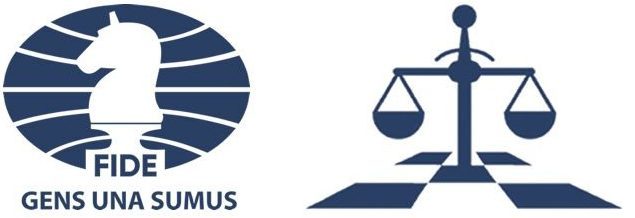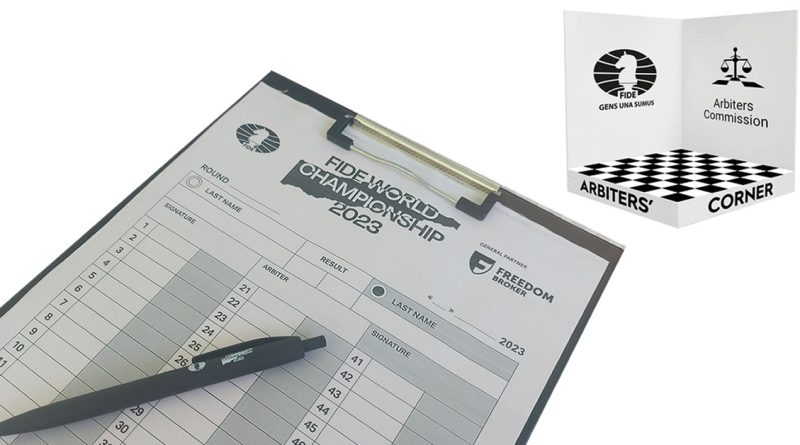Recording the Moves in Advance
IA Anantharam Rathinam
There was an interesting case during a Youth tournament. The player was forfeited for recording moves in advance.
According to Article 8: The recording of the moves and I quote article 8.1.2 “It is forbidden to record the moves in advance, unless the player is claiming a draw according to Article 9.2, or 9.3 or adjourning a game according to Guidelines III”
When asked why the arbiter forfeited the game, the arbiter replied that forbidden can also be applied as an irregular move or can be considered as unsportsmanship because the player repeated the same offence three times.
The question is: Is recording a move in advance is considered as an illegal move?
First of all, recording the moves in advance is not illegal, because it does not come under the purview of either article 3 or 7.5.2 to 7.5.4, which deals with illegal moves. There are also exceptions to the rule. When a player having the move claims a threefold repetition which is about to appear or 50 moves made by both players without pawn movement or piece capture are about to appear, the player has to write the move in advance and claim the draw.
The specific time penalty mentioned in the Laws of Chess is that of adding two minutes to the opponent in case of the first illegal move by a player and a wrong three fold repetition or 50 move rule draw claim (Guidelines III about quickplay finish also has this penalty but is not very much used). Then, what are the penalties to be applied where there is no specification, especially for minor violations like recording the moves in advance, not recording the moves properly, writing unwanted matters in the scoresheet, touched piece violation, disturbing the opponent, irregularities (not illegal move), always keeping the hands over the clock, making a move with one hand and pressing the clock with the other hand, frequent unnecessary draw claims etc.?
In general, the arbiter starts with a warning for the above mentioned minor violations. If the player repeats the same violation, the arbiter may add a minute to the opponent. If it is done again and if the arbiter guesses that the player is doing purposely, the arbiter may warn him and add two minutes to the opponent. He also has to warn the player that if he does it again, it is understood that he is intimidating the arbiter, bringing disrepute to the game of chess. The arbiter may inform the player that if he repeats the infringement one more time, he will be declared lost. Declaring a player lost for this type of first or second violation may be a heavy penalty. The player might have been given one or two more chances to correct himself.
8.1.1 In the course of play each player is required to record his/her own moves and those of his/her opponent in the correct manner, move after move, as clearly and legibly as possible.
There have been several similar instances in the past that an arbiter has declared a player lost for repeated transgressions by a player. In a major tournament in US, a few years back, a top ten ranked player in the world was declared lost by the chief arbiter Tony Rich for writing irrelevant matters in the scoresheet.
In the first three rounds of the tournament, it was accused that the player was taking notes. In his round one game against GM Daniel Naroditsky, the player had written in his score sheet read, “Use your time you have a lot of it.” Though any official complaint was not made, the arbiter had noticed it. In round two, the score sheet read, “Sit down for the entire game. Never get up.” When GM Sam Shankland complained to Rich, the player volunteered to show the notes and then agreed to strike them out.
Rich noticed the player again taking notes in the third round and gave him a second official warning, at which time he notified him that a third instance (actually it was the fourth instance) would result in forfeiture.
In round nine, the score sheet/a separate paper had the sentence: “Double Check and triple check” and “use your time.” The player was forfeited from the round nine game against GM Varuzhan Akobian. Akobian also complained that this distracted him.
What do the rules say?
8.1b The scoresheet shall be used only for recording the moves, the times of the clocks, offers of a draw, matters relating to a claim and other relevant data.
11.3 During play the players are forbidden to use any notes, sources of information or advice, or analyse any game on another chessboard.
11.5 It is forbidden to distract or annoy the opponent in any manner whatsoever.
11.7 Persistent refusal by a player to comply with the Laws of Chess shall be penalised by loss of the game.
In another interesting case, the chief arbiter Ganesh Babu, a B grade international arbiter declared a player lost, for not recording the moves several times, in spite of repeated instructions. The player sent a complaint to FIDE and the brief complaint is given below:
Arbiter Ganesh Babu who was chief arbiter decided that I am lost while I was a positionaly and materially up in the 8th round of the below mentioned tournament.
Arbiter Ganesh Babu insisted me to write the score sheet as I was missing last 2 moves, this happened twice. Then he came; reduced my clock time when my timer was having only 1.35 sec to 0.35 seconds, next when I missed to write the last 2 moves, he wrote on our score sheet 1-0 and declared me as lost. I was playing black.
Ganesh Babu, in his reply to fide, attached those scoresheets which were standing testimony to the behaviour of the player. Ganesh Babu had given him a long rope, warning/adding time to the opponent/reducing the time of the player from 2nd to 7th rounds.
In spite of his repeated instructions, he did not record the moves properly. Hence, he had to take the extreme step of declaring the loss of the game of 8th round, according to the article 11.7.
“11.7 Persistent refusal by a player to comply with the Laws of Chess shall be penalised by loss of the game.”
The abstracts of the reply from the then chairman of the Arbiters’ Commission Mr. Takis Nikoloplous to the player:
Dear player,
According to the article 8.1.1 of the laws of Chess :
8.1.1 In the course of play each player is required to record his own moves and those of his opponent in the correct manner, move after move, as clearly and legibly as possible, in the algebraic notation (Appendix C), on the ‘scoresheet’ prescribed for the competition.
If the player fails to comply with this Law of Chess, the Arbiter has to apply penalties according to the art. 12.9 of the laws of Chess:
12.9 Options available to the arbiter concerning penalties:
12.9.1 warning,
12.9.2 increasing the remaining time of the opponent,
12.9.3 reducing the remaining time of the offending player,
12.9.6 declaring the game to be lost by the offending player (the arbiter shall also decide the opponent’s score),
11.7 Persistent refusal by a player to comply with the Laws of Chess shall be penalised by loss of the game. The arbiter shall decide the score of the opponent.
As you can see from the above articles of the Laws of Chess, the Chief Arbiter of the tournament had any reason to forfeit you, as he and his assistants had previously warned and penalized you many times (almost in every round of the tournament) for your infringement of the Laws of Chess (not recording the moves one by one, during the game)during the tournament.
With best regards,
Takis Nikolopoulos
Chairman (at the time of this incident)
FIDE Arbiters’ Commission
IA Anantharam Rathinam

